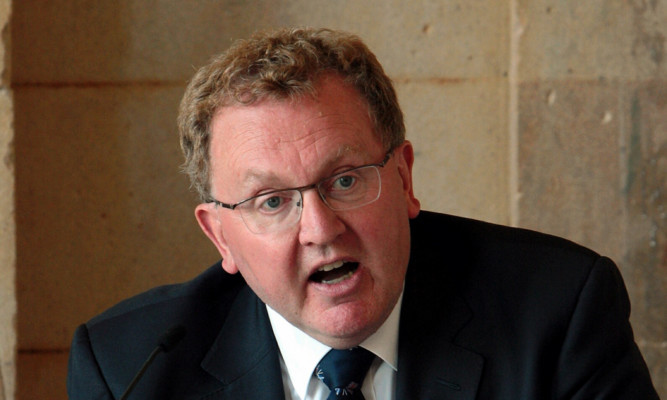There is no guarantee that a future UK Government could not hold up Holyrood decision-making indefinitely under Scotland’s new devolution settlement, according to a Scotland Office minister.
UK ministers have repeatedly denied SNP accusations that they have written a right of “veto” into the draft devolution law to prevent Holyrood making benefit changes that Westminster finds unacceptable.
The date of implementation of any Scottish benefit must be agreed with the UK Government, fuelling SNP accusations that Westminster could use this clause to hold up unpalatable benefits for years.
David Mundell, Scotland’s only Conservative MP and junior minister in the Scotland Office, told Holyrood’s Welfare Reform Committee that he would personally make sure an agreement on benefits does not take years.
But he said he “can’t guarantee” he will be around after the general election.
He said it would “not be feasible in terms of the political reality” for any future government to hold up Scottish benefits amid the inevitable outcry it would provoke from MSPs.
But he would not commit to redrafting the law to remove the SNP’s supposed “implication” of veto, saying only that the clauses “are out for discussion and consideration” and open to Scottish Government “feedback”.
SNP MSP Kevin Stewart said: “Could you give us some clarity on how long a consultation between the two governments could go on for?”
Mr Mundell said: “Over my period in the Scotland Office I found that sometimes these matters can be resolved in hours and sometimes they take considerably longer.
“But I am making it clear that there is goodwill on our part in terms of bringing these objectives about.”
Mr Stewart said: “Can you confirm to the committee that it would not be a matter of many years for one of these consultations to be dragged over?”
Mr Mundell said: “If it’s anything to do with me, which I can’t guarantee, it would not be a matter of years.”
Mr Stewart said: “As you say, you can’t guarantee that it will be you.
“Could you confirm that one of these consultations cannot go on indefinitely, which is effectively a veto?”
Mr Mundell said: “Nobody wants to see that happening.
“I think everybody also understands the politics of Scotland, the respect that the UK Government has demonstrated for the Scottish Government and the Scottish Parliament, and would not engage in that sort of subversive delay because it would simply not be feasible in terms of the political reality.
“I’m sure you (MSPs) and others would be making that point.”
He added: “There would be no intention to veto proposals put forward by the Scottish Government, either upfront or by some sort of behind the scenes way.”
Mr Stewart said: “So it would have been better if the language in the draft clauses had been put in a different way?”
Mr Mundell said: “The draft clauses are out for discussion and consideration.
“There is an opportunity for the committee, for individuals within the parliament, for the Scottish Government, and we’re in a very close dialogue with John Swinney who is leading for the Scottish Government in these matters in relation to the clause.
“If there is particular feedback in relation to the clauses then that can be given.”
Mr Stewart said: “But you can categorically say that although the implication in the language in the clause is of veto that there is no veto.”
Mr Mundell said: “Well, I wouldn’t have taken that implication of veto. I take the clear position of working together, but there is no veto.”
